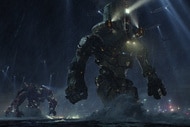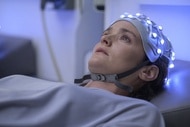Create a free profile to get unlimited access to exclusive videos, sweepstakes, and more!
30 years ago, Captain Planet and the Planeteers imagined a kinder world. What can we do better now?

Captain Planet and the Planeteers is celebrating its 30th anniversary this month, and even though the show looks like a gentle relic now, back then it was hailed for its commitment to educating children about the role that they could play in preserving and protecting the world.
The animated superhero series was first broadcast by TBS on Sept. 15, 1990, and followed the story of five teenagers with magical rings (the Planeteers) fighting to save the world from pollution with the help of a "superhero" (Captain Planet) who formed when the Planeteers' power came together. Though Captain Planet was never as popular as Teenage Mutant Ninja Turtles, it performed well enough to run for six seasons from 1990 to 1996 — with the series run from 1993 to 1996 being retitled The New Adventures of Captain Planet and airing on Turner Program Services — and have a spin-off video game, action figure line, Marvel comics limited series, and promotional crossover with Burger King. Today it is perhaps best remembered for its catchy theme song, whose lyrics many millennials still know by heart.
Phil Harnage was the senior staff writer of DIC Entertainment when Ted Turner, the billionaire TV producer and founder of TBS and CNN, approached the company with his idea. Harnage tells SYFY WIRE that the entire production team “had real visions of changing the world by doing something with real social ramifications." Though he feels that the show fell short of its goal, he takes comfort in the fact that it “got kids to step up further and start recycling."
A NEW VISION
Harnage says that Turner originally tasked DIC and Hanna-Barbera with creating a concept for the show. With nothing to go on except that there were superpowers involved that combined to make an even more powerful character, Harnage and his colleagues came up with a scenario wherein Gaia, the spirit of the Earth, reached out to teenagers from specific global regions — Africa, Asia, South America, Eastern Europe, and the United States — and tasked them with saving the planet from pollution.
Turner loved DIC’s approach and decided to commission them with his full support. This included pulling in famous actors to voice some of the characters; Whoopi Goldberg was the original voice of Gaia, and the musician Sting played her evil counterpart, Zarm. Then there was the question of who would voice Captain Planet. Turner originally wanted Tom Cruise, because he was the biggest movie star in the world at the time. But after Cruise recorded the first couple of episodes, Harnage says, “we had to face the unpleasant realization that he did not have a superhero voice.” (David Coburn would later be chosen as the titular hero.)
NAVIGATING DRAMA
From the beginning, Harnage says that the show tried to tackle things that no other cartoon was dealing with: killing animals, genetic modification, and harmful things that humans do to the environment. He explains that Captain Planet ran into controversy with its episode about overpopulation, "Population Bomb.” Though his script used mice as analogs for humans in a riff on Gulliver’s Travels, TBS refused to air the episode in the first season because it was worried about the trouble it might cause.
“We tried to take a stance with these things,” Harnage says, “and do it in such a way where we offended as few people as possible because we didn’t want the Catholic church or evangelicals condemning Captain Planet for trying to warp children’s minds."
That is why so many of the first season’s episodes covered benign issues that everyone could get behind, such as the need to protect the planet from pollution. But, while most episodes focused on more generic environmental issues, like recycling and protecting endangered animal species, Captain Planet was still able to address some more specific and serious topics. After getting past the population control episode, Harnage says they “felt more comfortable with tackling heavy subjects." One such highlight was “A Formula for Hate,” which tackled HIV stigma and helped viewers understand that the virus could not be spread through casual touch.
“Captain Planet was trying to head off what actually turned out to be the whole anti-science thing," Harnage says. Reflecting on the legacy of Captain Planet, he accepts that there are limits to what one can do with a cartoon. The one big thing he would change, if the show were revived today, is its approach to violence and consequences.
Not because this generation has become desensitized, but because, as he explains, “Kids don’t have a concept of being the person that violence gets done to. So they get triggered into this pattern of othering people. It’s very ‘us versus them’ and ‘We don't care what they feel’ or ‘They can’t feel because they aren’t like us.’ I would want to use the cartoon to show the results of violence and pain in people's lives.”
The idea would be that developing empathy for others fits naturally with preserving the planet. Showing children how their actions affect the greater community not only makes them more responsible, it also helps them understand their place in the world and how they can make it a better place.
HOW ENTERTAINMENT CAN ENGAGE KIDS TODAY
Kenyon Farrow — the co-executive director of Partners for Dignity & Rights, a national organization that works to guarantee universal rights for people across the U.S. — recalls that shows like Schoolhouse Rock! and Captain Planet helped spur his interest in the world beyond his neighborhood. Whether they are demonstrating how a bill is passed through Congress or the importance of climate change, he believes shows that teach children how the world functions are essential.
“Imagine being a kid in California and no one being willing to explain to you why the sky is blood-red,” Farrow tells SYFY WIRE, explaining that a show like Captain Planet could help young viewers make sense of the wildfires that are ravaging large swaths of California. “I think kids see and understand what's happening more than we think they do," he says. "It is our role, not to shelter them from reality, but to help give them perspective. We give kids a sense of safety through knowledge, not by pretending that things don't exist.”
Looking at the impact that COVID-19 is having on the planet, Farrow says that an “animated program with catchy jingles and action that appeals to children could help them understand the full implications of the disease."
This is particularly important to Farrow because of his career in reporting on science, health issues, and leading economic justice organizations. “I was not a good student in science or math because those things were taught in ways that were disconnected from my lived reality," Farrow says. "But if my science and biology classes had focused on HIV, that would have changed my engagement, because at that point AIDS was impacting the entire planet.”
He believes that entertainment can offer accessible explainers outside of the traditional classroom setting. “That way we can create entry points into subject areas that are traditionally considered ‘too hard,'" he says. It could even inspire a new generation of science-focused kids to develop new cures for the coronavirus and the challenges the world will undoubtedly continue to face down the line.
DIGGING DEEPER AND ERASING STIGMA
Connecting kids to the bigger picture beyond fire safety and protecting the world from contagions is just as important now as it was when Captain Planet first aired. But this generation of media-savvy audiences is too sophisticated for didactic Planeteers. More than being told what to think, they want their entertainment to demonstrate the courage of its own convictions.
Kassandra Frederique — the executive director of Drug Policy Alliance, a national nonprofit dedicated to ending the war on drugs — tells SYFY WIRE that “entertainment too often puts forward a particular angle without spending enough time exploring the conversation.” This glib perspective affects everything from how Black men are perceived to how girls view their bodies. Frederique says changing this means “decolonizing information” so that it does not perpetuate harmful tropes. It also means dropping the “notion that ‘I know everything and I'm going to teach you,’ because it's not sustainable and it does not build trust.”
"Young people have access to more information than they've ever had before," she continues, which makes engaging them crucial. Instead of telling young audiences what to think, creatives should provide them with valuable information, and try to lead them toward making healthier decisions.
This guidance does not mean dictating the terms. Frederique says that “when an adult tries to lead and direct the conversation, they reinforce power dynamics, which forces young people to navigate those power dynamics to get to the thing that they need.” But when an adult shifts the power dynamics to create a conversation where she or he is learning about what a kid wants, it becomes a collaborative process and a mutually beneficial conversation.
Harnage acknowledges that Captain Planet failed at engaging kids in thoughtful discussions, noting the criticism he has received about its “heavy-handed messages.” Even though the show embraced teamwork, it still operated from a patriarchal and authoritative viewpoint of "do what I say, or the world will end."
Perhaps if Captain Planet is ever revived, it can fix that tone-deaf approach by demonstrating greater empathy for people who lack the privilege to pursue conservation and environmentalism as easily as its heroes did. After all, if entertainment wants to educate and engage the next generation, it needs to pursue sophisticated narratives that show viewers more than simple tropes, and leave dictating how they should see the world in the past.


























